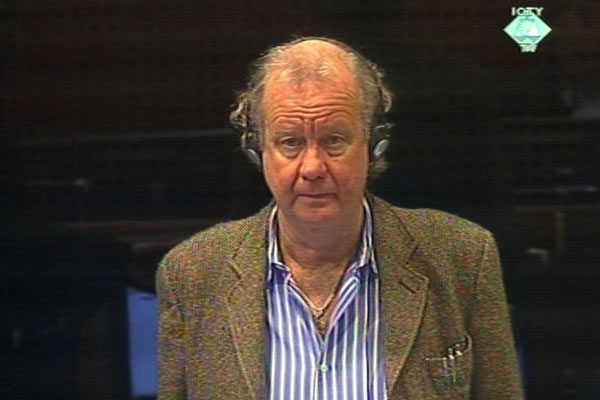Home
RADOVAN KARADZIC MEETS ED VULLIAMY FOR THE SECOND TIME
Ed Vulliamy testified at the trial of Radovan Karadzic. In early August 1992 Vulliamy was in a group of British journalist who visited the Omarska and Trnopolje prison camps at the invitation of the Republika Srpska president, now in the Tribunal’s dock. When Karadzic claimed Vuillamy was ‘anti-Serb’, the witness replied ‘I don’t want to be neutral’ in cases involving racist violence
 Ed Vulliamy, witness at the Radovan Karadzic trial
Ed Vulliamy, witness at the Radovan Karadzic trial Ed Vulliamy, British journalist who writes for the Guardian, was in a group of foreign journalists who were the first to enter the Omarska and Trnopolje prison camps in the Prijedor region in early August 1992. Their video recordings and reports about the abominable treatment of the prisoners there triggered the international response that resulted in the establishment of the Tribunal in The Hague in May 1993.
Interestingly, it was Radovan Karadzic who personally opened the gates of Omarska and Trnopolje to the foreign journalist. In the summer of 1992 when the first articles about the prison camps under the Serb control were first published in the world press, Karadzic openly invited the British journalists to come and see that it was all a ‘fabrication of the Muslim propaganda’.
Now, 19 years later, Vulliamy faced Karadzic for the second time, in a Tribunal’s courtroom where the former Republika Srpska president is on trial for double genocide and other crimes in BH. Murder and inhumane treatment of prisoners in the prison camps in the Prijedor region are among those crimes. The transcript of Vulliamy’s evidence from the trial of former president of the Prijedor Crisis Staff Milomir Stakic was admitted into evidence, together with a series of video recordings the British journalists made on 5 August 1992 in Omarska and Trnopolje.
Vulliamy recounted that the British journalists were only allowed to enter the camp mess, and not the rooms where prisoners were held. Later he learned that about 80 prisoners ‘who were in better shape’ were selected to be paraded before the guests from Great Britain, the witness said. The prisoners were starved and scared to death. ‘I don’t want to lie to you, but I can’t tell you the truth’, a prisoner told the British journalists.
After Omarska, journalists were taken to the Trnopolje prison camp. According to the witness, the prison camp was surrounded by barbed wire on three sides and prisoners were held inside. A prisoner told Vulliamy that he had been brought in from Keraterm where about 200 persons had been killed in a single night. The prisoner said that even more people were killed in Omarska. The British journalists visited the make-shift prison infirmary. There they asked Dr Idriz Merdzanic if prisoners were beaten up. Merdzanic replied by nodding almost imperceptibly.
In the cross-examination, Karadzic brought up excerpts from Vulliamy’s book Seasons in Hell. According to Karadzic, the book shows the witness is not ‘neutral’ but ‘anti-Serb’. ‘I don’t want to be neutral if I have to make judgments about prisoners and their guards, or victims of rape and their rapists’ Vulliamy said, adding that this didn’t mean he was not objective. ‘If you enter a house and see six bodies there, you can’t say there are 12 bodies because they are Muslims or three because they are Serbs. Six remains six’, Vulliamy said, illustrating his standpoint.
Karadzic put it to the witness that the mass murders that the prisoners in Trnopolje described to the British journalists never took place in the camps. As Karadzic said, the prosecution witnesses have all claimed they saw only one murder in Omarska. Karadzic criticized Vulliamy, saying he put far too much trust in the stories ‘that blamed the Serbs’ about the mass murders in Keraterm and Omarska. ‘With all due respect, I don’t believe you’, the witness replied. As Vulliamy explained, the information about the murders he got from the prisoners in Trnopolje was corroborated by what he learned as he talked to dozens of other prisoners. These were the adjudicated facts, established in a number of trials before the Tribunal, Vulliamy noted.
Karadzic also claimed that Omarska was an investigation center and that the witness himself used the term in his book. The witness reminded Karadzic that the term was used in his text in quotation marks. This means that he only quoted what the Serb officials in Prijedor who ‘hosted’ the British journalists claimed. The witness agreed with the accused that Trnopolje couldn’t be considered a ‘concentration camp’ because it was not apposite to draw parallels with the Holocaust. However, the witness insisted that it was a prison camp where a large group of civilians was concentrated before they were deported in convoys from the Bosnian Serb-controlled territory.
Linked Reports
- Case : Karadzic
- 2011-11-08 WITNESS: WE HAD TO WAIT FOR ‘MORE PROPITIOUS MOMENT’ TO PUNISH CRIMES
- 2011-11-03 INVESTIGATING MASSACRE AT KORICANSKE STIJENE
- 2011-11-02 WITNESS: PRISONERS WERE TAKEN OUT TO BE EXCHANGED, NOT KILLED
- 2011-11-10 EXODUS OF NON-SERBS FROM BOSANSKI NOVI
- 2011-11-11 ‘VOLUNTARY’ EXODUS
- 2011-11-14 KARADZIC SEEKS YET ANOTHER SUSPENSION OF TRIAL
